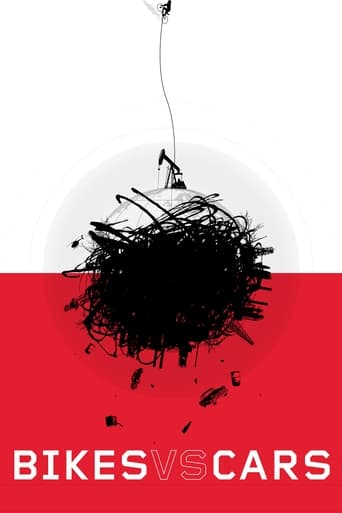Cathardincu
Surprisingly incoherent and boring
Billie Morin
This movie feels like it was made purely to piss off people who want good shows
Raymond Sierra
The film may be flawed, but its message is not.
Vihren Mitev
I do not hide my personal bias towards the subject. I travel by bike everywhere - to the university, to work, to the shop, I ride it for sport.Like Super Size Me, Food Inc. and What the Bleep Do We Know, Bikes vs Cars is a movie that will make you reflect on your worldview. Exiting the conventional is required here. The themes of technology, ecology, progress and policy pops up in front of the viewer giving him a lot of new information and putting him before the choice of how to live his life.Divided into several parallel developing parts the film takes us into the world of people who ride bicycles, lead an environmentally friendly way of life and fight for their right to freedom on the roads. What future we have to choose and do we have the opportunity to do it fighting automakers and construction companies.How long are we going to live in this paradigm?My blog: http://vihrenmitevmovies.blogspot.bg/
clarkj-565-161336
I saw Bikes vs. Cars last night at the Canadian Premiere at Hot Docs Toronto. We were very fortunate to have the film director Fredrik Gertten at the presentation as well. I am very biased as I love cycling. I think what the film shows us is the huge impact that our lifestyle and car obsession is having on the planet. We get local information from a selection of diverse cities such as São Paulo Brazil, Bogotá Colombia, Los Angeles USA, Toronto Canada, Copenhagen Denmark. In each city, grass roots communities have come together to promote cycling and urban sustainability. We get a particular focus on São Paulo where we see the outcome of a successful campaign to install bike paths on Avenida Paulista. The film is shot in such a way that you actually feel you are on the bike in the middle of traffic. Exhilarating and scary sometimes.
sjh-16
This documentary focuses on the human stories behind the issue of using bikes rather than cars in large, modern cities. The main focus is on Sao Paolo and Los Angeles but there are excursions to Bogota, Berlin, Copenhagen and Toronto, which are not well connected to the main stories. The interviewees's stories are interesting and they are articulate, but there is only one expert to give a more general or academic viewpoint. The presentation is very one-sided, with car-drivers not really given a fair shot, and a lone taxi-driver in Copenhagen left to complain about bike riders making life difficult for car drivers. A huge omission is China, where cities are coming to grips with probably the earth's most rapid transition from bikes to cars. Overall, interesting and well-filmed as far as it goes, but far from being a balanced or rigorous treatment of an important issue.

